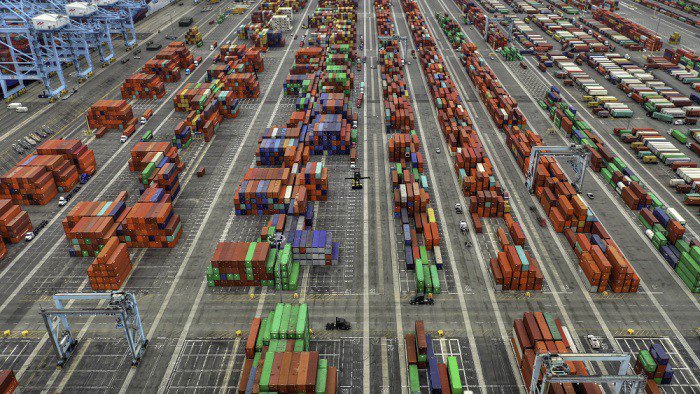
The global auto industry has always been a web of intricate supply chain management, manufacturing, and distribution. The record demand for ocean shipping and its effects on the value of the supply chain for the auto industry are among the key factors that have recently attracted a lot of attention.
The dynamic interaction between ocean shipping and the auto industry reshapes how vehicles are produced, distributed, and delivered to consumers in a world that is becoming more connected and where goods are sourced from different parts of the world.
Rising Ocean Shipping Demand
Demand for ocean shipping has increased unprecedentedly over the past few years. A wide range of factors has influenced this phenomenon. The shipping sector has reached its breaking point due to booming global trade and rising consumer demand. This situation has provided opportunities for the auto industry to improve the value of its supply chain, despite being difficult for many different sectors.
The automotive industry's sourcing of parts and components is heavily reliant on international markets. Automobile manufacturers are being forced to further optimize their supply chains by looking for affordable suppliers from around the globe as the demand for ocean shipping increases. Due to the diversification of suppliers, the risk of localized factors disrupting the supply chain has decreased.
Lean Inventory Management: The need for record-high ocean shipping has forced auto manufacturers to implement leaner inventory management techniques. Manufacturing done just-in-time (JIT), already a hallmark of the sector, has taken on greater importance. Automobile manufacturers can keep their inventories leaner, lower storage expenses, and improve overall operational efficiency by receiving their components on time.
Supply Chain Resilience: Across industries, supply chains were found to be vulnerable due to the global pandemic. The auto industry was no different. Automakers have been forced to re-evaluate and improve the resilience of their supply chains due to the spike in ocean shipping demand. This includes using dual-sourcing techniques, creating buffer inventories for essential components, and spending money on risk-reduction tools.
Innovation in Logistics: Logistics companies are implementing cutting-edge technologies to meet the growing demand for shipping. Predictive analytics, real-time tracking, and blockchain-based solutions are some of these, and they can significantly improve supply chain visibility and transparency. These advancements will benefit the auto industry by giving it more control over its international operations.
Impact on Auto Industry's Supply Chain Value
Increased Agility: The increased agility the auto industry must develop in response to record ocean shipping demand significantly increases the value of the supply chain in the industry. Manufacturers are becoming more adept at responding quickly to shifting shipping schedules, port traffic, and logistical difficulties. They can keep their production and delivery processes running smoothly thanks to their agility.
Cost reduction: While the increased shipping demand has raised ocean freight costs, it has also encouraged the auto industry to reduce the costs associated with its supply chain. This entails reassessing shipping routes and transportation options and even researching the viability of local assembly plants. Automobile manufacturers can partially offset the increased shipping costs by strategically managing logistics.
Market Expansion: The value of the auto industry's supply chain goes beyond its operational effectiveness and includes its ability to penetrate new markets. Global markets are now more connected due to increased ocean shipping demand. Automakers can profit from this by entering emerging markets and streamlining their distribution systems to reach more consumers.
Collaborative Partnerships: The shipping and automotive industries are closely related. Innovative solutions to shared problems can result from partnerships between the two industries. Automakers and shipping firms can collaborate closely to create more environmentally friendly transportation strategies, investigate shared logistics infrastructure, and jointly address environmental issues.
Challenges and Future Prospects
Record ocean shipping demand offers opportunities, but the auto industry has difficulty adjusting to this new reality.
Environmental Issues: Carbon emissions and other environmental pollution caused by the shipping industry are a growing source of worry. The shipping industry must work with the auto industry to investigate more environmentally friendly transportation options, such as alternative fuels, electric ships, and increased efficiency, as it works to reduce its carbon footprint.
Infrastructure Stress: The sharp increase in shipping demand has highlighted the strain on the world's ports and shipping routes. Congestion in ports can cause delays that affect the entire supply chain. Automakers must promote infrastructure upgrades and invest in backup plans to minimize potential disruptions.
Technological Integration: While the potential for innovation in logistics is enormous, it can take time to integrate new technologies into current supply chain systems. Automakers must invest in strong IT infrastructure, data analytics capabilities, and workforce training to fully benefit from these advancements.
Conclusion
The auto industry is not an exception to how the record ocean shipping demand is changing the global supply chain landscape. Manufacturers must develop novel strategies to raise the value of their supply chains as they negotiate this new reality. The industry is changing to adapt to the challenges posed by the rise in shipping demand, from diversifying suppliers to implementing lean inventory management.
Long-term, the interaction between the shipping and auto industries promises increased productivity, adaptability, and market growth. Both industries can cooperate to build a more robust and interconnected global supply chain ecosystem by embracing collaborative partnerships, investing in sustainable practices, and utilizing cutting-edge technologies. The auto industry's success in a changing world will undoubtedly depend on its capacity to adjust and take advantage of the shifting shipping landscape as the journey progresses.





 Get instant quote
and compare offers in real time
Get instant quote
and compare offers in real time